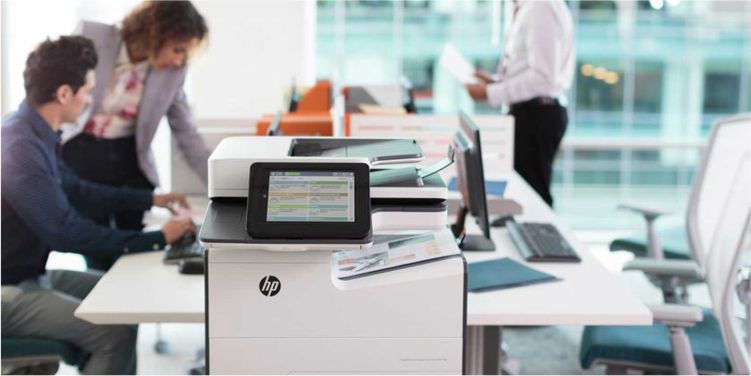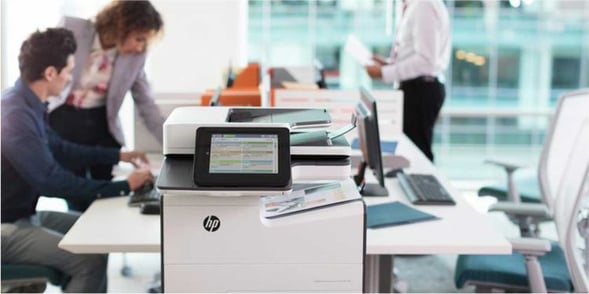1. Copy Speed
This key statistic tells you at what speed the device will produce copies and prints. Expressed as a number or pages per minute this is normally the first requirement discussed when considering the purchase of a new digital photocopier or multifunctional device. The copy speed also correlates to the copy volume (see number two) with faster devices generally having a larger copy volume. A typical workgroup device designed to be shared amongst between 3 to 10 people will normally have a print/copy speed of 25-45pages per minute (ppm) placing the device in the mid-volume category.
2. Copy Volume
This number relates to the amount of pages per month the photocopier, printer or multifunctional device has been designed to process. Generally photocopiers and printers with lower copy speeds are designed to process a lower number of prints and copies per month with the copy volume growing in relation to the speed of the device. For ease of understanding photocopiers are generally grouped into volume categories rather than dealing with the actual number. The categories include, SOHO (small office, home office) for occasional use, low volume, mid volume, high volume and professional print. When considering the purchase of a multi-functional device or photocopier try to estimate how much the device will be used and select appropriately.
3. Network Capability
As a general rule when spending what can be a considerable amount of money into a digital document device most people seek to get as many benefits and features from the device as possible. One of the key features of digital document production devices such as printers, photocopiers and MFD (multifunctional devices) is the ability to interface with a customers' computer network. Once connected to the network the humble photocopier becomes a powerful, feature rich network printer, scan, fax server and much more. When looking at network functionality you should consider which operating systems you use as well as how you want the device to sit within the network. As a general rule, almost all mid-volume sized machines upwards come with full network functionality as standard.
4. Scanning Features
A network connected digital photocopier or MFD (multi-functional device) is generally the ideal platform for use as a feature rich network scanner. With the advent of colour touch screen interfaces on many devices and internal processing hardware to rival most desktop computers most digital document devices are now able to scan directly to your desktop, email or even directly into your key business applications such as Sage, Goldmine and many more. When looking at MFD devices consider how you might want to use the scanning features of the machines and what efficiencies may be found within your business processes.
5. Additional Features & Benefits
Modern multi-functional devices, printers, scanners and photocopiers offer a huge range of features over and above the standard feature set. With most modern photocopiers including some form of open source programming platform embedded in the very usable touch screens, software developers have created a whole host of "bolt on" applications specifically designed to enhance your printing, photocopying and scanning experience. With automated document workflow solutions, scan/document editing applications and accessibility programs to name just a few* you might want to check with your prospective supplier that the photocopiers, printers or scanners you are considering have an embedded application platform that allows for additional 3rd party software to be installed. *Accessibility programs allow control of the photocopier/printer/scanner/multifunctional device(MFD) from a hand held touch screen device such as a PDA for individuals who may struggle to utilise the original touch screen on the device.
5. Manufacturer
Once you have a good idea of the features, speed and benefits of the photocopier, MFD, scanner etc. you probably want to start looking at who actually makes the device in question, their reputation as a business and their device track record. There are many names within the Digital Office Solutions marketplace including Ricoh, Canon, Toshiba, Samsung and Konica Minolta. Many digital office solutions resellers will be brand loyal to one or two manufacturers based on their individual preferences. Bigger resellers will partner with all the major manufacturers and will, as a rule, be able to offer more independent advice. For completely non-biased opinions many prospective buyers rely on independent equipment reviewers such as BERTL and Which. As a rule of thumb you want to purchase equipment from an established manufacturer, with a good market share (check with IDC or InfoSource websites) who will be able to provide longevity of support to you and your chosen reseller. Other considerations are the manufactures Environmental Policies and views on Corporate Social Responsibility for which information is normally found within their respective websites.
5. Purchasing Options
At a time where capital expenditure is controlled and closely managed the modern purchaser is looking for more flexible way to source the funding for digital office solutions such as photocopiers, printers, scanners and MFD's. When choosing your prospective supplier it is worth investigating the payment options they have available above and beyond outright purchase. The majority of business now look to lease their digital office equipment to provide a tax efficient method for obtaining their photocopiers and more. Leasing additionally offers an excellent upgrade path to ensure the equipment purchased is kept up to date and at the forefront of current technology.
6. Post Sales Support Options
When purchasing a digital photocopier, scanner or multi-functional device that will form an integral part of a digital document workflow it is important that you consider what will happen if the device develops a fault. Modern photocopiers, printers and other digital document hardware have a huge amount of mechanical parts within them and as such are almost certain to suffer from some form of mechanical failure at some point. Key digital office solutions resellers will have some form of post sales support infrastructure in place normally in the form of a full service contract agreement. A typical service agreement will cover the cost for all labour and parts required to service the machine and are normally charged at a cost per print or cost per development rate. When choosing a supplier it would be a good tip to understand what post sales support options they have available, at what cost and whether or not they service the equipment themselves, or through a 3rd party.
7. Compatibility
Business networks are complicated systems comprised of many varying technologies, and when considering the addition of a network capable digital photocopier, printer or scanner it is vital to ensure the hardware will be compatible with your existing systems. Leading digital office equipment suppliers should be able to perform pre-installation surveys to ensure the MFD, photocopier etc is compatible with your network and the software applications you use. As a general rule, however, most leading digital office solutions will work with leading software and network hardware. You can normally find more information about the compatibility of a device from its product brochure.
8. Price
Always a key factor in the purchase of any item however market analysis has shown that price is not always the key focus for many consumers when making digital office solutions purchases. There are a huge number of photocopiers, printer, scanner and MFD sales websites available on the web so don't be afraid to shop around and get ball park pricing for the type of device you are interested in. Do remember, however, when weighing up the price of a potential solution that with the advances in modern digital photocopiers, printers, scanners and multifunctional devices, it is not just the value of the hardware you will be paying for but also the advanced features and workflow capabilities inherent within the machines in question.


